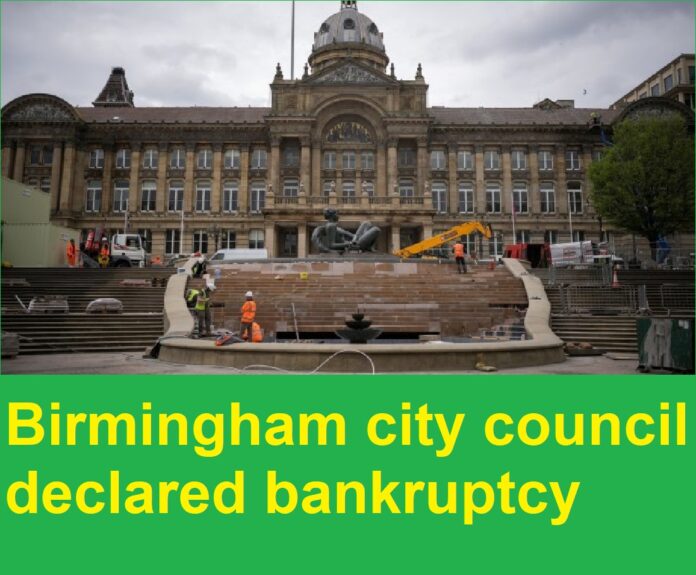The Birmingham City Council has officially declared bankruptcy, which has abruptly halted all operations with the exception of those necessary for providing critical services. Demands for equal pay and internal mismanagement are the two main causes of the council’s financial crisis, according to the organization. Surprisingly, the UK government has decided against offering any more financial assistance.
The second-largest city in England, Birmingham, made headlines on September 5 when it declared bankruptcy. Non-essential spending has completely stopped as a result of this choice. Birmingham City Council’s action follows those of many other local governments, including Woking, Croydon, and Thurrock, all of which are battling budget deficits in a UK economy that is in peril.
Notably, the government lead by Prime Minister Rishi Sunak’s Conservative party has decided not to step in and save the Birmingham City Council. The government has previously provided additional funding, equal to about 10% of the council’s budget, but it has since emphasized that local budget management is the responsibility of the elected councils themselves. The press was informed of this position by Prime Minister Rishi Sunak’s spokeswoman, Max Blain.
However, what precisely is a “Notice 114”?
by a city council anticipates that its revenue will not be sufficient to meet its expenses, it will formally declare this by issuing a Section 114 notice. In an effort to protect critical services, a number of local authorities, including Thurrock, Croydon, Slough, Woking, and Northamptonshire, have resorted to issuing Section 114 orders to limit any non-essential spending.
What led to the Birmingham City Council’s precarious financial situation, then?
There are several causes that have been noted:
Equal Pay Disputes: According to the majority of local sources, Birmingham’s female citizens’ requests for equal pay appear to be the main cause of these disputes. Potential equal pay claims from female employees might cost as much as £760 million, according to the Labour-led council.
IT System Costs: According to sources, the council spent significantly more than its £19 million budget on an Oracle IT system. The anticipated cost ballooned to £100 million as a result of delays and implementation problems.
Spending on the Commonwealth Games: Last year, the council invested a substantial £184 million in its effort to host the Commonwealth Games.
Clean Air Zone Costs: Although the contentious Clean Air Zone brought in close to £90 million, a sizeable chunk was reinvested on hydrogen buses and cycle lanes.
Other Expenses: Other costs include a $13 million investment in the 2026 European Athletics Championship, covert costs for “inclusive” street signs, and a comprehensive “Green roads” scheme.
Economic Challenges: The financial crisis was made worse by inflation, a rise in the need for adult social services, and sharp drops in company tax revenue.
According to the BBC, the Birmingham equal pay scandal began in 2012 when a group of 170 women, including teaching assistants, cleaners, and caterers, successfully sued the council for equal pay. They claimed that the council had not given them the same advantages and pay as their male counterparts who were doing identical duties.
Birmingham is not alone in this financial dilemma; councils all around the UK are facing comparable difficulties. The Local Government Association (LGA) predicts a startling £3 billion financial deficit over the next two years to sustain services at their current levels, according to a report by The Guardian.
Currently, the Birmingham City Council is in charge of several services, including:
Service for Adult Education
Older Adult Services
Supporting Healthier Lives Through Parks, Recreation, and Well-Being
Birmingham’s Volunteer and Community Health and Care Services
The council will be compelled to give priority to core services as a result of the bankruptcy declaration, leaving many other essential city functions without the funding they require. The council declared, “The Council does not now have any other means of covering this debt and does not have adequate resources to satisfy the equal pay cost. The notice requires an immediate halt to all additional spending, with the exception of that required to protect the most vulnerable and provide statutory services.
This depressing situation highlights the difficult financial constraints that local governments in the UK face, which call for serious thinking and strategic planning to assure the ongoing well-being of their communities.


